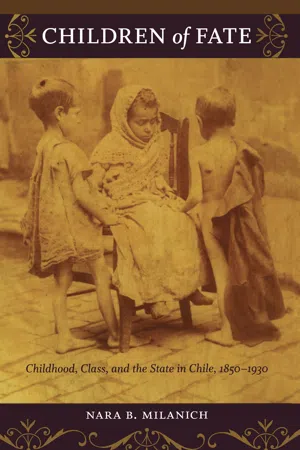
Children of Fate
Childhood, Class, and the State in Chile, 1850–1930
- English
- PDF
- Available on iOS & Android
Children of Fate
Childhood, Class, and the State in Chile, 1850–1930
About This Book
In modern Latin America, profound social inequalities have persisted despite the promise of equality. Nara B. Milanich argues that social and legal practices surrounding family and kinship have helped produce and sustain these inequalities. Tracing families both elite and plebeian in late-nineteenth- and early-twentieth-century Chile, she focuses on a group largely invisible in Latin American historiography: children. The concept of family constituted a crucial dimension of an individual's identity and status, but also denoted a privileged set of gendered and generational dependencies that not all people could claim. Children of Fate explores such themes as paternity, illegitimacy, kinship, and child circulation over the course of eighty years of Chile's modern history to illuminate the ways family practices and ideologies powerfully shaped the lives of individuals as well as broader social structures.
Milanich pays particular attention to family law, arguing that liberal legal reforms wrought in the 1850s, which left the paternity of illegitimate children purposely unrecorded, reinforced not only patriarchal power but also hierarchies of class. Through vivid stories culled from judicial and notarial sources and from a cache of documents found in the closet of a Santiago orphanage, she reveals how law and bureaucracy helped create an anonymous underclass bereft of kin entitlements, dependent on the charity of others, and marginalized from public bureaucracies. Milanich also challenges the recent scholarly emphasis on state formation by highlighting the enduring importance of private, informal, and extralegal relations of power within and across households. Children of Fate demonstrates how the study of children can illuminate the social organization of gender and class, liberalism, law, and state power in modern Latin America.
Frequently asked questions
Information
Table of contents
- Contents
- Illustrations and Tables
- Acknowledgments
- Introduction: State, Class Society, and Children in Chile
- I. Children and Strangers: Filiation in Law and Practice
- II. Children of Don Nobody: Kinship and Social Hierarchy
- III. Other People's Children: The Politics of Child Circulation
- Epilogue: Young Marginals at the Centenary: One Hundred Years of Huachos
- Appendix
- Abbreviations
- Glossary
- Notes
- Bibliography
- Index